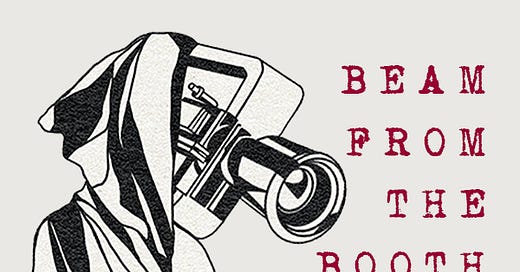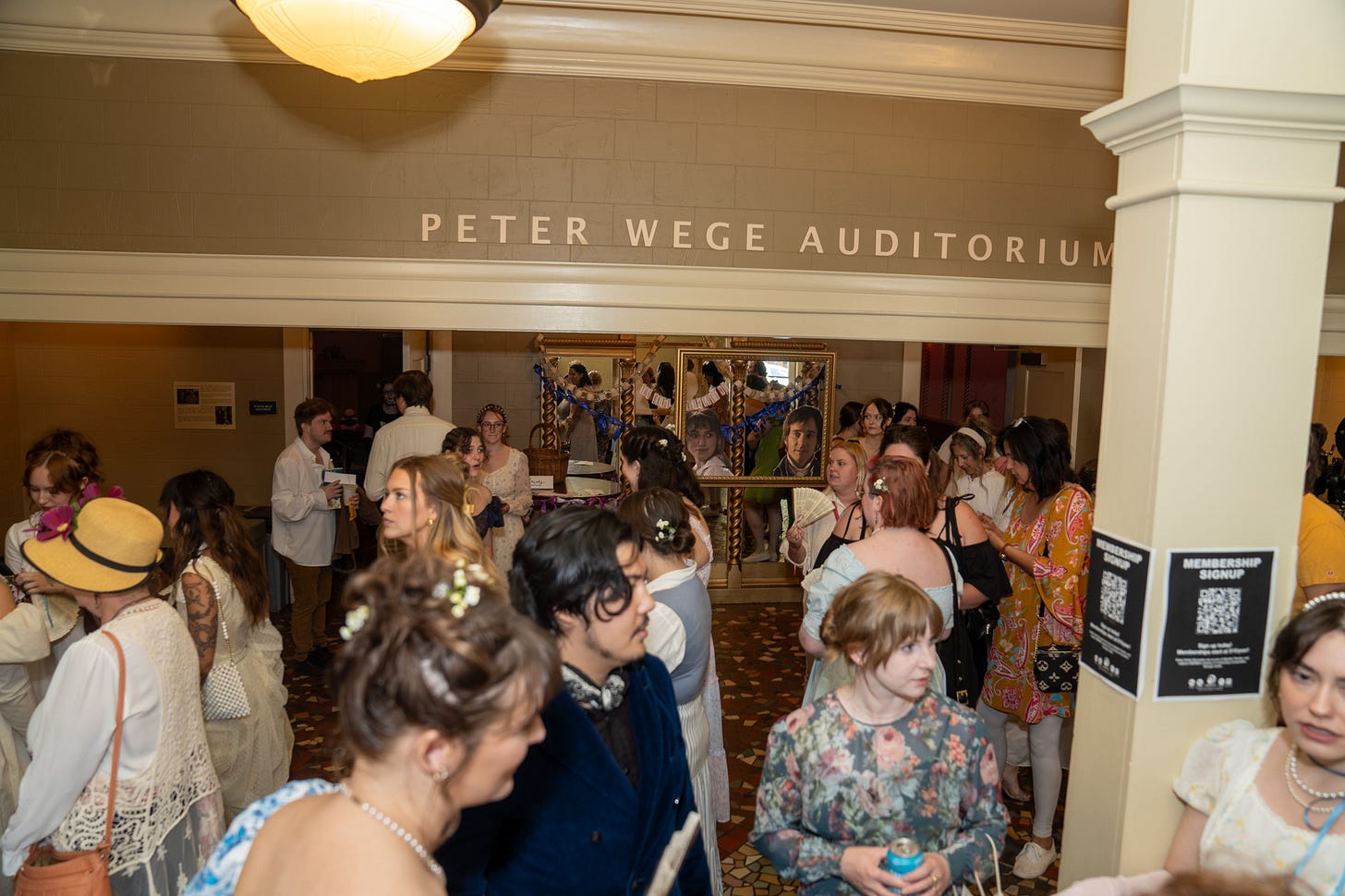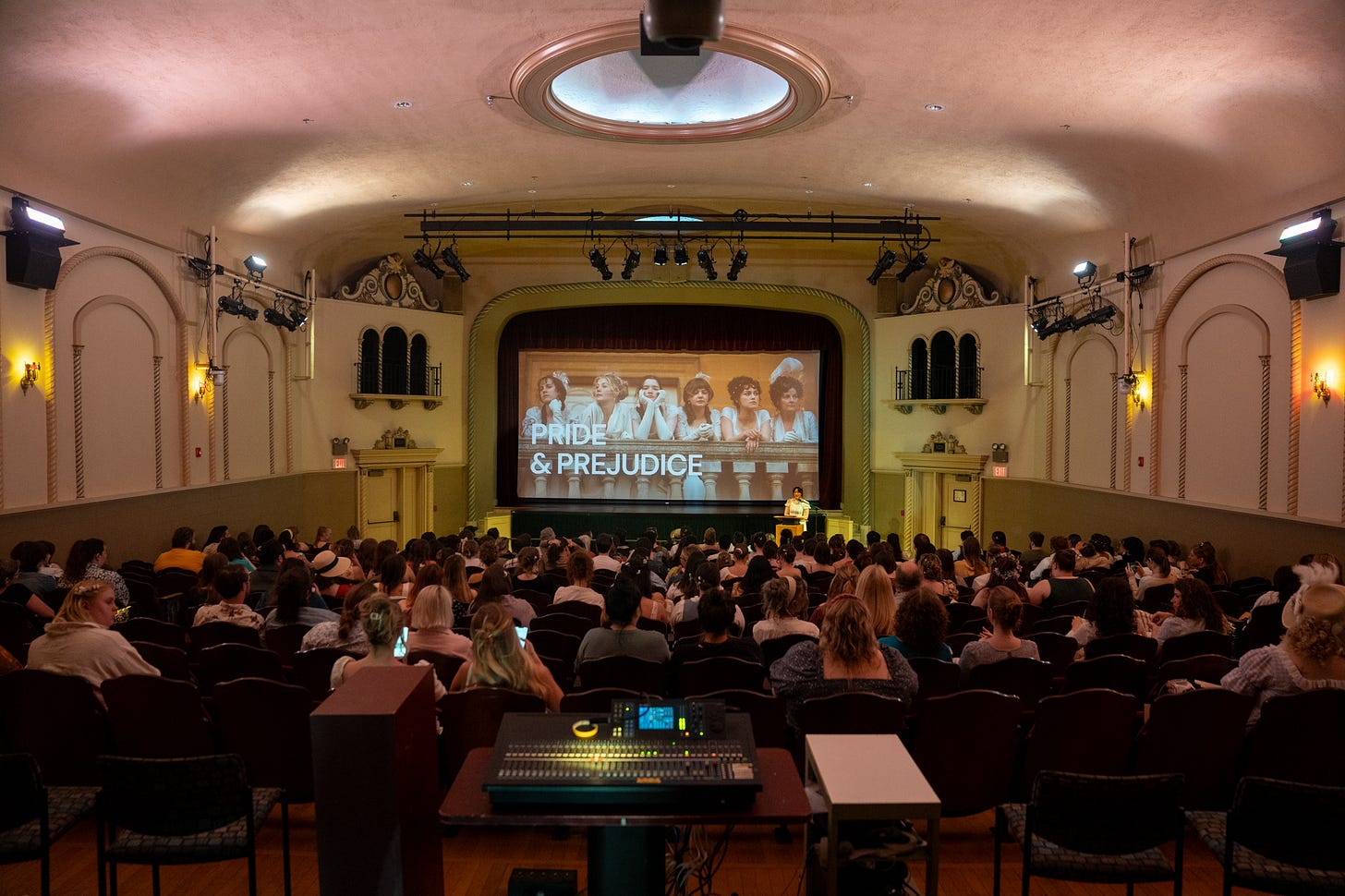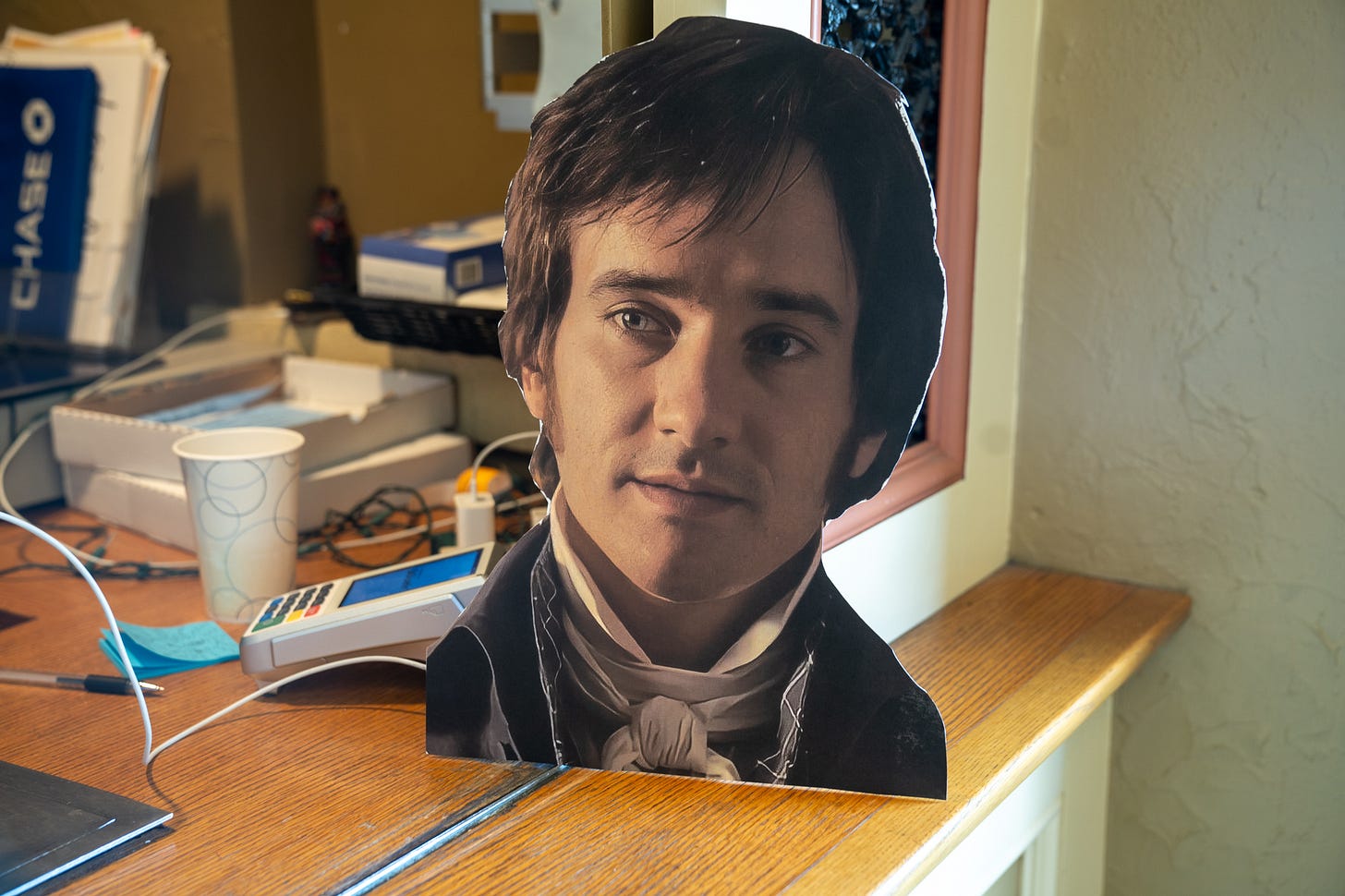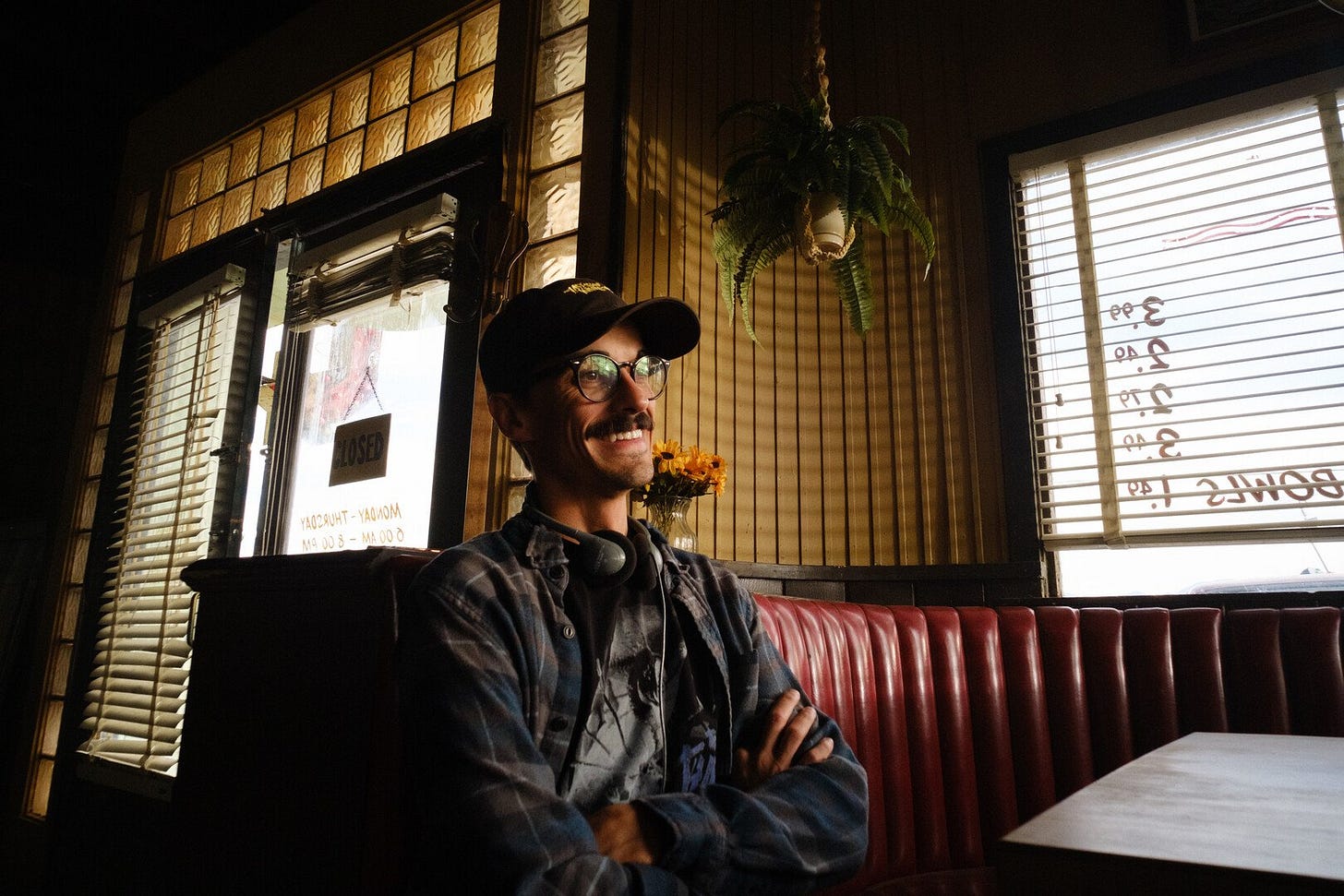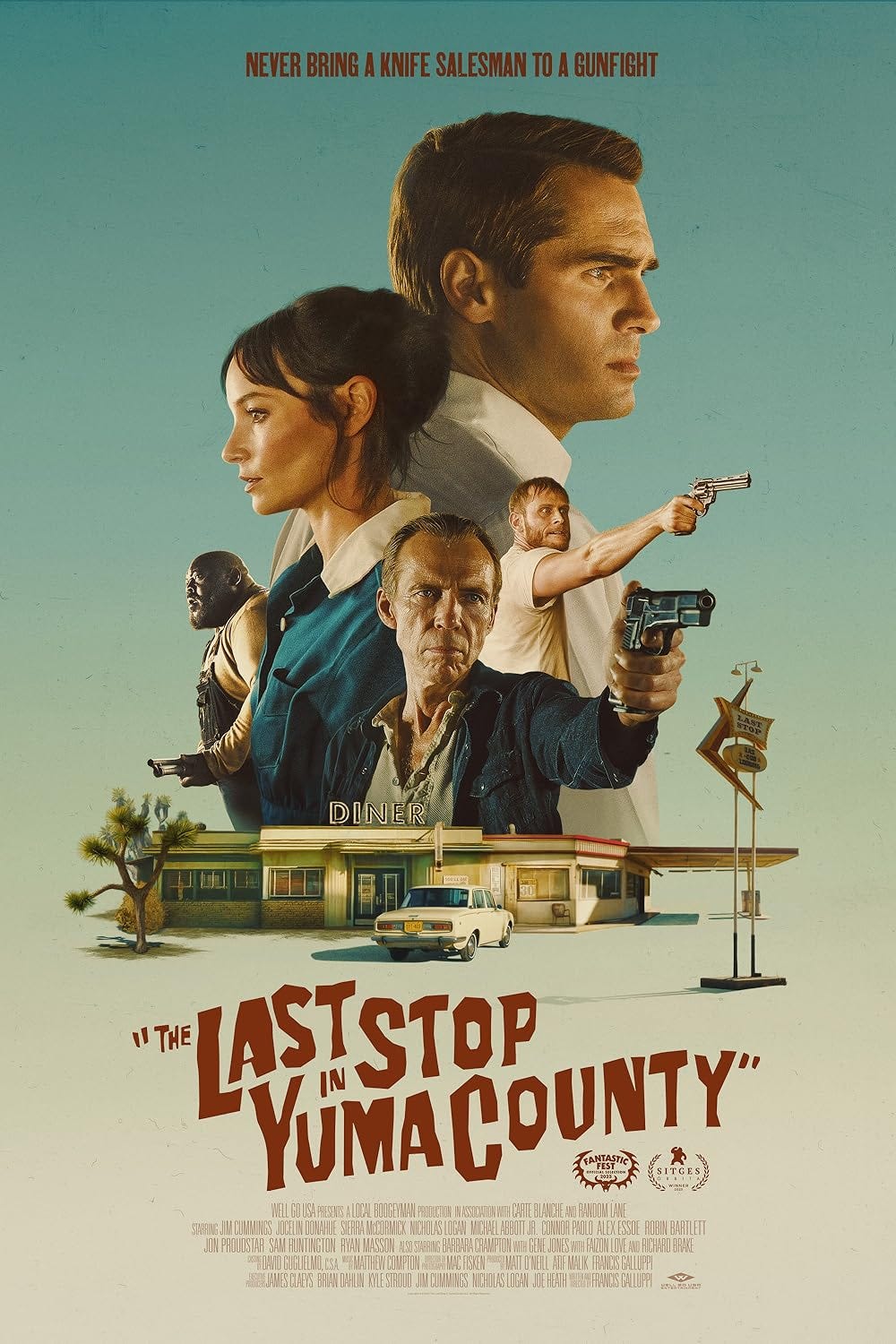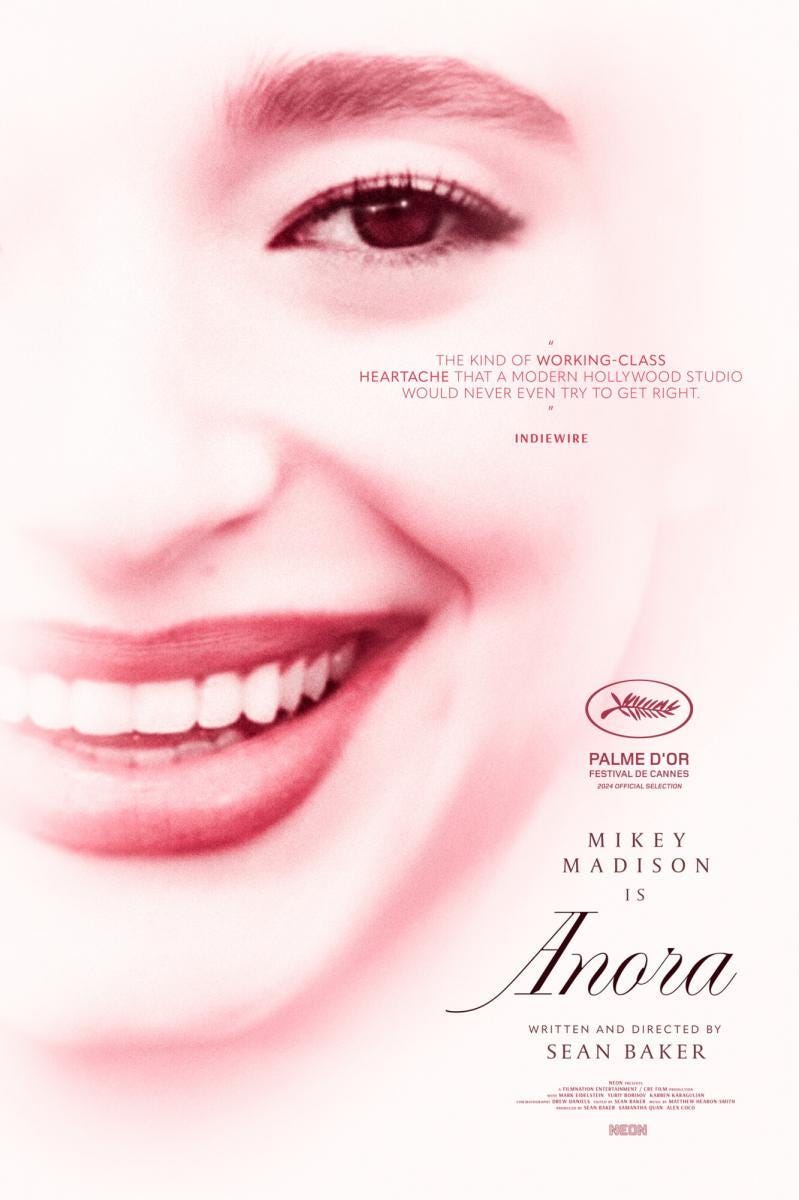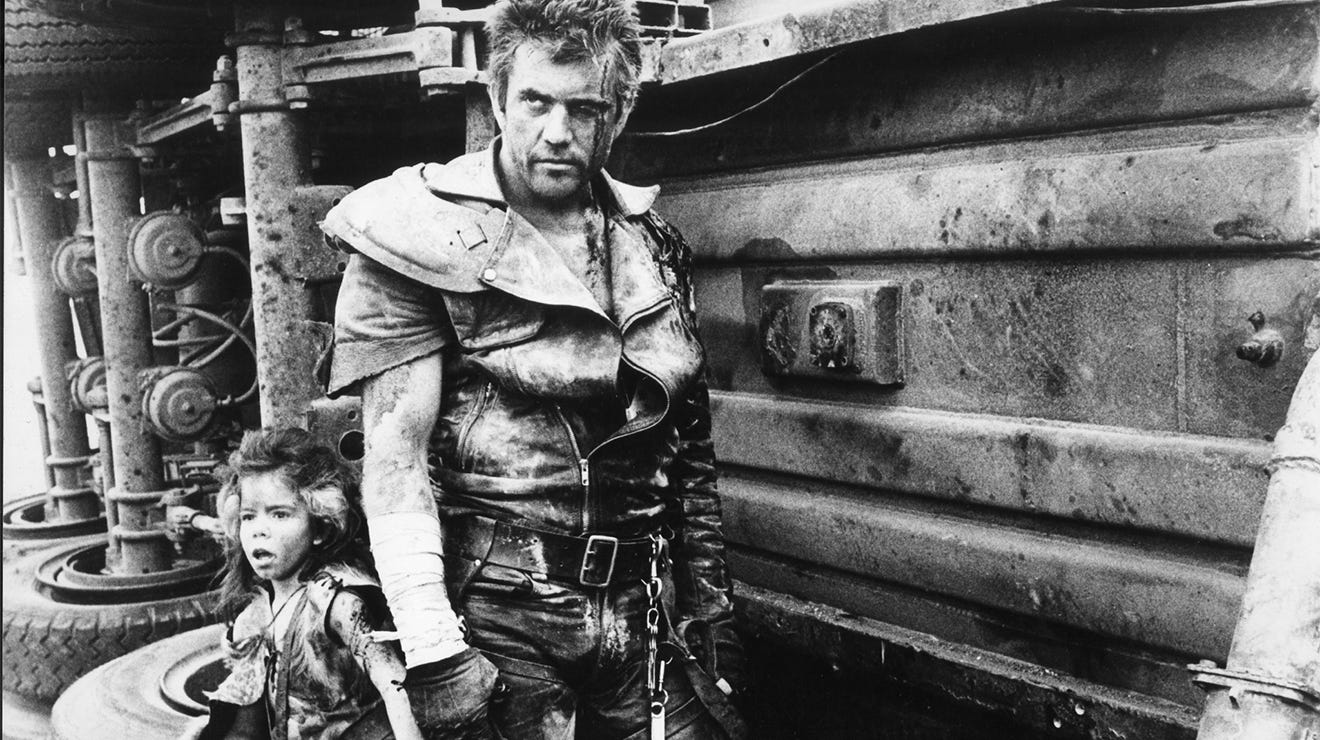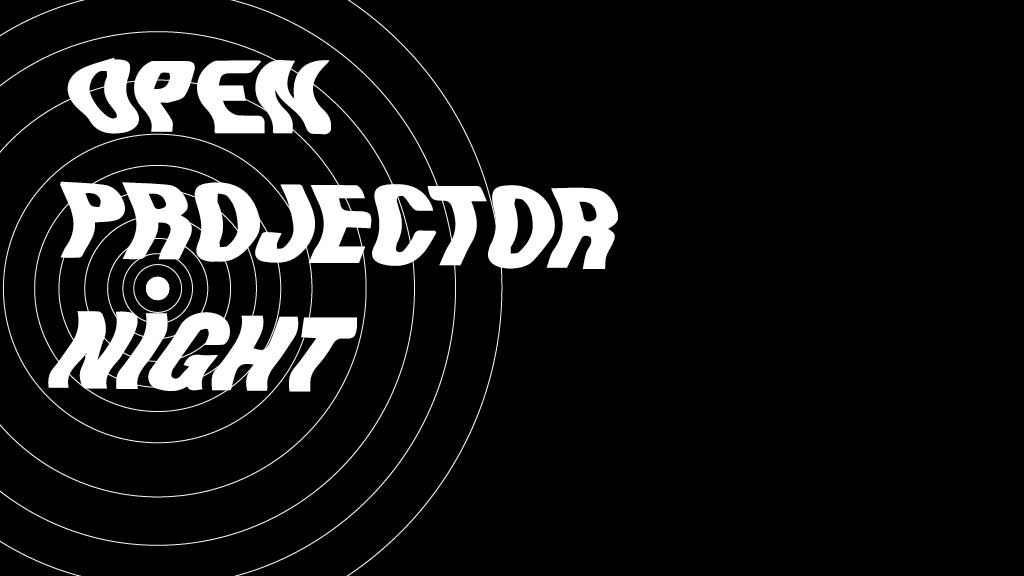[EDITED BY: GRIFFIN SHERIDAN & SPENCER EVERHART]
Hello and welcome back to an all-new installment of BEAM FROM THE BOOTH brought to you by GRAND RAPIDS FILM SOCIETY!
THANK YOU to all who made our PRIDE & PREJUDICE event such a success this past Sunday — a huge shout-out to our own Breana Malloy and Lauren Patchett for coordinating the festivities and to our partners for this event at Books & Mortar and Hyssop Floral as well. It was a magical afternoon that had us swooning for the rest of our weekend!
Up next, we’re screening SHE IS CONANN — the gender-bent take on the classic Conann tale — NEXT MONDAY NIGHT (6/17) at 8pm! This one looks like it’s going to be a real trip (which is to be expected, as the film is distributed by Altered Innocence, who also brought us The People’s Joker). Don’t miss it!
We’re thrilled to feature the work of exciting independent voices both in our screenings and in our newsletter. Which is why we’re extra excited about the first piece in this week’s issue...
FILMMAKER SPOTLIGHT
FRANCIS GALLUPPI
[BY: MATT EVERITT]
It has been wild to watch Francis Galluppi’s star rise over the past six months, the kind of ascension that most filmmakers dream of. His first feature film, The Last Stop in Yuma County, has been receiving rave reviews, and he recently announced his next project will be an Evil Dead film that he’s writing and directing.
I met him a while back through our work with the band Mt. Joy, and I’ve been lucky enough to have a front row seat to his whirlwind of a year. I mean it when I say this couldn’t be happening to a better person.
What’s striking — and what I hope comes across in our conversation — is how well he’s suited for the moment he’s in. He’s a wealth of hard-earned insight, and my hope was to share a little bit of what it’s like to have a conversation with someone like him. As a filmmaker, I’ve found him to be a source of no-nonsense advice and encouragement, and I hope you find that here as well.
Below is our conversation, edited for brevity and clarity.
***
With The Last Stop in Yuma County, you’ve said before that you could have made it years earlier if you had cast someone with a big traditional Hollywood name, but you chose to only cast people who felt like they lined up with your vision. And you've always had a very strong sense of ‘I am here for this.’ Where did that come from?
Punk rock. Listening to punk music and being in bands and growing up with that strong, DIY ethos of like “pack it with people and sell this venue out.” You know what I mean? Or let's buy a little four track recorder and make our own demos and burn CDs and make our own labels. I've always sort of been like, I don't need anybody else kind of thing. Help would be nice, but I just assume that nobody's gonna care as much as me.
And when I say I'm going to do something, I'm going to do it, and I'm going to put all 110% of my energy into that thing.
And on top of that I want to work with good people, too. Like Jim (Cummings) is an incredible actor. He is an incredible filmmaker, and I thought obviously he was perfect for the role, but also, I could hang out with this guy for years.
Congratulations on getting to write and direct one of the new Evil Dead movies, that’s huge! How does it feel switching genres for your next film?
I love horror films. Horror is the thing that made me really get into movies in the first place. But I don't want to keep making horror movies. I want to make a Sleepless in Seattle <laughs>. And I’m obviously so, so passionate about Evil Dead. If I didn't see The Evil Dead, I don't think I would've gone out to the middle of nowhere with my friends and made something for no money. That was the thing that inspired me to do it. It wasn't about doing this because it's a good opportunity.
I'm interested in good stories and good, compelling characters.
With Kubrick, the guy did every genre of storytelling, right? He did sort of the best version of every genre. I love movies. We love movies. I would always be scared like, well, now that I did Evil Dead, I'm only gonna get hired for horror films.
One of the things that slipped under the radar with everything going on in your world is your Rolling Thunder commentary track. When did you first see that movie?
Thanks for bringing that up. That's so funny 'cause for me that's a bucket list thing, and I was so happy to do it. And everyone's like, “Okay, whatever. Who cares? Commentary? What is that, Blu-Ray? Who buys Blu-Ray?” You don't understand, that is my entire life. It's my entire film school, buying physical media and listening to commentary. So to get asked to do that was really cool. But to answer your question, I don't know, like 10 years ago? I was definitely older.
I actually got an opportunity to ask Sam Rami about the montage in Rolling Thunder. Because It's very similar to Evil Dead 2, with his hand getting cut off and then sawing off the shotgun. I asked him “Did you, are you inspired there?” He said something along the lines like “I can't confirm or deny, but I’m pretty sure I saw that movie before I wrote Evil Dead 2.” And I was like, I figured!
You said a lot of your film school came from commentary tracks, and there's almost different genres of commentary tracks. You have the Criterion historian who comes in and is essentially reading their own essays at you. There's the filmmaker who doesn't really remember anything and so they're just kind of filling in some time. But then you get the cast together and you get like four people in the room. I love those ones, where it's the Safdie Brothers on Uncut Gems, or the Armageddon one is legendary because Ben Affleck is buzzed out of his mind. What makes the best kind of commentary track?
If I really want to get some more insight on the filmmaking process, then I want the version where it's a little bit more educational. But I mean, it depends what you're in the mood for, right? I mean the Stepbrothers commentary is just as good as the movie itself.
I feel like some filmmakers say stuff in a commentary track that they wouldn't say in an interview. For instance, I always remember the commentary for Shaun of The Dead, Edgar Wright said something along the lines of “When I was filming this scene, I was ripping off so and so.” I forgot who it was, might have been Carpenter. And Simon Pegg's like, “Yeah, you always gotta rip somebody off.”
I remember thinking that I didn't see John Carpenter at all. I see Edgar Write fully. He has such a voice, such a tone. I think if you're being completely true to yourself, your voice as an individual is always going to outshine the thing that you are inspired by, as long as you're staying true to your voice.
I just did a commentary for Last Stop. I did three commentaries, one with my cinematographer Mac Fisken, one with my EP James Claeys, and then one with Jim and Jocelyn. Each time, because we're so close and there's nobody asking us questions, you say things where it’s like, “I don't know if I should have said that!”
Any bonus features that stand out for you? The obvious one for me is the Lord of the Rings extended edition…
Oh yeah. Just, yeah.
Yeah. The mountain top. Are there any other featurettes from other projects that stick out to you?
There's one really funny one that I think is worth mentioning.
So there's a Shout Factory documentary called “Tainted Blood” on the Bordello of Blood disc. And it's one of the most depressing but funny documentaries about making this movie. It is basically Cory Feldman just being like, I really wanted to care, and I tried to get other people excited to make this movie, and nobody on the set gave a shit. Basically everything that could go wrong went wrong. And the only person who agreed to do the documentary is Corey Feldman. So it's just a talking head of Cory Feldman talking about all the things that went wrong.
There's a similar one on the Ghost Rider 2 disc, the Nic Cage movie. They had the big budget, you know, everything's ready to go. And they brought in these directors who had done Crank and some other relatively indie action movies, maybe six weeks before they started shooting. And over the course of this documentary, you just watched the life drain out of their faces. It honestly changed the way I look at movies and even write about them on Letterboxd. I feel that to get below two-and-a-half, three stars, you have to be morally offensive because so few people set out to make a bad movie.
Jim and I talk about this all the time. It's a miracle that any movie gets made because it's the craziest investment ever. Beyond that, it's a miracle that any movie is good. There's a million things that need to go right, and there's a million little things that can go wrong that all of a sudden you made a bad movie.
You never know if you're making a good movie or not when you're on set, you have no idea. Honestly, it was summer camp every day on Last Stop. We all loved being there. I couldn't help thinking “Oh, the movie's gonna be bad” because you hear that story, right? The better time you have on set, the worse the movie is. And thank God it's not a complete piece of shit.
When I was done with the first cut, I'd watched the whole thing from beginning to end, and I just came out in the kitchen and I was like, “Uh Rach (my wife), I fucked up.” I would show my friends and they'd be like, “No, dude, it's good”. And I'm like, “Are you lying to me? You're just saying—"
—that you're not capable of knowing if it's good or bad because we're friends.
It's funny, my DP, Mac, he's done all my short films and music videos, and he is the most cynical human being ever. That's why we get along so well, because he'll just straight up be like, no, that sucks. And for the longest time, even when all the positive reviews were coming up for The Last Stop, he was like “It's all bullshit”. But we did a Film Independent screening like two weeks ago, and he came up to me, this is after all the good stuff has been going on, and he was just like, “Dude, the movie's actually pretty good!”
That's amazing.
The short film I did before this is called Gemini Project, and we shot it before Covid shut everything down. So it didn't do the whole festival run. It came and went very fast because of Covid. And I was just sending it to friends and family, and they were like, “Congratulations, you made a short film!”<laugh>. I'm happy with that short film. I really think Gemini Project was the short film that really got Jim and Jocelyn on board. So years later, it actually did come into play.
When you're doing second AC or you’re gaffing or you're PA'ing, you make a short film that you think nobody cares about and it all plays into the bigger picture. It is crazy when I think about retracing every person that I met that led to Last Stop and all the pieces that made it come together, I could literally retrace it all the way back to the very first thing that I said yes to.
I love that. It gets rid of this, almost mercenary precision, about decision making to ‘make it.’ Where it's like, oh, I can only do the thing that's gonna level up my career.
Not only that, some people have this idea that like, I made a $2,000 short film, so now to level up my next short film needs to be $30,000 and I need to have a bigger crew, and I need to have an editor, on and on.. Like that's what stops people from making stuff is having this idea of I need $30,000 to make a short film. I always tell people: set a date. It'd be whatever, July 20th, we're gonna start making this thing. Don't pull back.
Oh, one hundred percent. Especially if you want to be a filmmaker, you really need to understand the connective tissue in between shots and what makes something gel. The AD on my last short (GRFS Board Member and all-around awesome person Jackson Ezinga) is a writer-director too. And he's an incredible AD. And so I was like, setting up a shot and he was like, “Hey, dude, think about this when you do this.” And I was like, “Oh. You're right.” To just have someone there to be thinking three steps ahead because he's done it all. And I had done a lot of my own stuff, but it was creating that environment for a team where everyone knows a little bit more about the whole process to have each other's back.
Yeah. And I've AD’d more than any job. Once you've AD’d enough, you're gonna have a better relationship with your AD. I've been in that situation, I know how stressful it is. I'm like, “Okay let's figure this out together. Give me three more takes here and I'll cut this thing” and you can sort of like reverse engineer it a little bit. You know? If you've never done that job before, you don't get it. But anyway, sorry, I'll get off my soapbox dude.
Honestly this is what I was hoping for! For people who are working on their first short film and are feeling hesitancy, feeling that reluctance, would you have anything you'd want to share with them? That one tidbit to hold onto that has really worked for you all the way through in your career?
So many things. Like, so many things.
One, don't wait for permission from anybody. Just start making your thing. I know Jim says this a lot, so I'm just taking the words out of his mouth, but nobody is going to believe in your movie more than you, and you should act that way. And it's true. You can have a producer that's like, “ah, I love your script so much,” but at the end of the day, nobody's going to sacrifice the things that you as a filmmaker are going to sacrifice to see this thing on screen.
Two, there’s so much you can do to start moving, to start getting momentum on your movie without money. You can write letters, you can reach out to actors. Everyone's a human being. The worst you're gonna get is no response at all, which fine, it's still worth taking a shot.
Next, be as prepared as possible. The second you do get an opportunity to work, to meet with a financier or somebody that's interested in financing movies, the more you have ready to go the more excited they're gonna be. It's almost like “Hey, I don't need you. I'm making this thing regardless of who you wanna come on.” Versus “It is completely contingent on you saying yes, and I need you to say yes so you can pay me to come up with a shot list.” You shouldn't be waiting for that. You should be making your shot list. You should be compiling look books for the characters and anything you can possibly do.
And trust me, if you are lucky enough to get paid to do all that stuff, you're never going to have the time to do it the way you want to do it. Because of Covid and everything, I got to prep Last Stop for over a year and that helped tremendously. I'll probably never get that time ever again.
And obviously your first film really matters, right? So start doing whatever you can with no money. Start prepping, start coming up with the shot list. Start reaching out to actors. Start looking at props on eBay. Start talking to HODs [heads of departments] and put together a team and find your locations. You don't need to wait. You can get in your car and start scouting locations around the area. I'm in SketchUp right now, designing a big set for an upcoming project, you know, and it’s only going to help.
Watch a ton of movies, educating yourself. It's crazy that it sounds pretentious, but God, I can't tell you how many times or how important that has been to every part of the success of Last Stop. You want to be able to talk to an actor and if their favorite director is Tarkovsky, you can have that conversation. You want to have that shorthand and be like “it's like that thing from blah, blah, blah.”
For instance, Jim knows how much I love Funny Games. And there was a scene where Beau was singing across from Jim and Jocelyn, whatever direction I was giving Jim, he just goes, “Tim Roth...Funny Games”.
I didn't realize at the time it was like, holy shit. I wrote one of my favorite movies into this story <laugh>. But it was that simple, you know? That happens all the time when you're meeting producers or whatever, just having that extensive knowledge of cinema and film history. It's really important.
***
For those interested, The Last Stop in Yuma County is now available to buy or rent on your favorite VOD apps!
PARTNER PICKS WITH GRAND RAPIDS PUBLIC LIBRARY
[FEAT. SPENCER EVERHART]
Inspired by series like Criterion’s Closet Picks and Letterboxd’s Four Favorites, GRAND RAPIDS FILM SOCIETY and our friends at the GRAND RAPIDS PUBLIC LIBRARY have teamed up to bring you all PARTNER PICKS: an ongoing series of brief videos featuring a member of the GRFS Board as they browse the vast and varied selection of films (and television!) available to check out at our local library.
In this latest installment, check out what our own Spencer Everhart pulled off the shelves...
If you’re interested in reading more about Spencer’s full list of recommendations, check out GRPL’s curated list. You can access these films — and thousands more — on shelves or online with your GRPL library card.
A very special thanks to GRPL’s HAILEY JANSSON for arranging, shooting, editing, and sharing this super fun series.
Stay tuned for more installments of Partner Picks in the future!
RE-RELEASE
INTERVIEW WITH LINDSEY NORMINGTON
Well this is very exciting.
MI-native LINDSEY NORMINGTON can now say that she has been a part of a Palme d’Or winning production! Normington stars as Diamond in director SEAN BAKER’s latest feature Anora, which just took home the coveted top award at this year’s Cannes Film Festival.
We had the privilege of hosting Normington for our Open Projector Night event in November 2022, at which her film won first place in our audience vote for best short of the night! We subsequently interviewed her about the film, her career, and her future, which you can find all the way back in our very first issue:
Likewise, we’re also pointing you towards this excellent interview from Vulture, featuring Lindsey and some of her Anora co-stars. Be sure to check out these interviews now, and mark your calendars for October 18th to see Lindsey in Anora when it hits wide release.
From the GRFS and the entire GR film community: congratulations, Lindsey!
UPCOMING EVENTS
SHE IS CONANN (Mandico, 2024)
WHAT: MICHIGAN PREMIERE! Hellhound Rainer roams the abyss, following Conann in each phase of her life, from childhood as a slave to Sanja through to her accession as queen.
WHEN: Monday, June 17th, 8:00pm
WHERE: Wealthy Theatre
MAD MAX: THE ROAD WARRIOR (Miller, 1981)
WHAT: THE KICK-OFF TO OUR SUMMER OF SEQUELS SERIES! The first sequel in George Miller’s now legendary MAD MAX franchise finds Max driving the post-apocalyptic highways of the Australian outback, fending off attacks from nomadic tribes that prey on outsiders.
WHEN: Monday, June 24th, 8:00pm
WHERE: Wealthy Theatre
WHAT: Our returning program of curated short films from independent filmmakers with a MI connection!
WHEN: Wednesday, June 26th, 7:00 pm.
WHERE: The Wealthy Theatre
And so we’ve arrived at the end of another BEAM FROM THE BOOTH! We appreciate you taking the time to read it and truly hope you’ll continue to do so. Be sure to SUBSCRIBE to get each issue in your inbox every MONDAY (usually), and stay up-to-date on all things GRFS.
Plus, join us on social media! We’d love to chat with everyone and hear YOUR OWN thoughts on everything above (you can also hop in the comments section below).
Know someone you think will dig BEAM FROM THE BOOTH? Send them our way!
Look for ISSUE #62 in your inbox NEXT WEEK!
Until then, friends...

